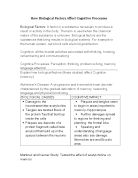Then again, lots of researchers have supported the idea that schemas affect cognitive processes, such as memory. The theory seems quite useful for understanding how people categorize information, interpret stories, and make inferences, among other things. Schema theory has contributed to an understanding of memory distortions as well as social cognition. However, the theory is not clear about how schemas are acquired in the first place, how they actually influence cognitive processes and that the concept of schemas is too vague to be useful.
Evaluate two models or theories of one cognitive process with reference to research studies
The two models or theories I will be looking for the cognitive process of Memory are the Multi Store Memory Model and the Level of Processing Model. I will be discussing the strengths and limitations of the model and the theory as well as including a few research studies to support my argument.
The Multi Store Memory Model (MSMM) was founded by Atkinson and Shiffrin (1968) and was one of the first models on the structure of memory. It shows that something you remember begins as environmental stimuli and is then passed on as sensory memory. If the person is focusing on it or if it is believed to be important, it is passed on to the Short-term memory with its duration of 6-12 seconds. It is only through rehearsal that information can be moved to the Long-term memory. Once stored in the Long-term memory, the information can be retrieved and passed back to the short-term memory and then back again.
The MSMM allowed most of the development on memory research and it outlines a very basic structure of the memory systems that other research has only develop. Besides, with the evidence of the case study of HM, the model shows the distinction between STM and LTM. Some patients have problems with STM but not LTM, and some may have problems with LTM but not STM. It also tells that encoding is different in both memory stores. In STM memory is encoded acoustically while in LTM, memory is encoded semantically.
Then again, with the development in technology and in psychology it has been shown that although the model’s main claim is still accepted the model gives a very simplistic view of how the memory works and is largely wrong at some points. The importance of rehearsal for storage in the long-term memory has been questioned by Craik and Lockhart (1972) and it has also been found that the Long-term memory store is divided into different sections specializing in the storage of different types of memory. The MSM has also been criticized due to the fact that the model does not go into any detail about the processing of information in exception to the reference of attention and rehearsal.
On the other hand, the level of processing model of memory by Craik and Lockhart, in 1972 was put forward partly as a result of the criticism leveled at the multi-store model. Instead of concentrating on the stores/structures involved such as short term and long term memory, this theory concentrates on the processes involved in memory. Craik and Lockhart suggest that we can process information in 3 ways: first, structural processing which we encode only the physical qualities of a thing; second, phonemic processing, which is when we encode its sound and third, semantic processing, which happens when we encode the meaning of a word and relate it to similar words with similar meaning. In short, the idea that the way information is encoded affects how well it is remembered. The deeper the level of processing, the easier the information is to recall.
Craik and Tulving carried out a psychology study in 1975 to investigate how deep and shallow processing affects memory recall. Participants were presented with a series of 60 words about which they had to answer one of three questions. Some questions required the participants to process the word in a deep way (semantic) and others in a shallow way (structural and phonemic). When Participants were asked to recall, they recalled more words that were semantically processed compared to phonemically and visually processed words. This experiment proves that semantically processed words involve elaboration rehearsal and deep processing which results in more accurate recall.
The theory is an improvement on Atkinson and Shiffirin’s account of transfer from STM and LTM. The levels of processing model change the direction of memory research. It shows that encoding was not simple, straightforward process. This widened the focus from seeing long-term memory as a simple storage unit to seeing it as a complex processing system. Besides, this explanatin of memory is useful in everyday life because it highlights the way in which elaboration, which requires deeper processing of information, can aid memory.
Then again, despite these strengths, there are a number of criticisms of the levels of processing theory. It does not explain how the deeper processing result in better memories. Eysenck (1990) claims that the levels of processing theory describes rather than explains. Deeper processing takes more effort than shallow processing and it could be this, rather than the depth of processing that makes it more likely people will remember something. Lastly, the concept of depth is vague and cannot be observed. Therefore, it cannot be objectively measured.








